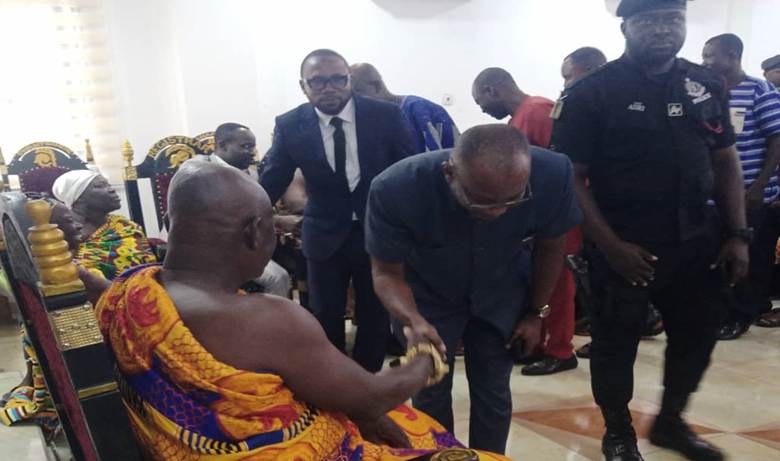The Bono East Regional Minister, Hon. Francis Owusu Antwi, embarked on a comprehensive three-day working tour of the eastern corridor of the region, culminating in a visit to the Atebubu-Amantin Municipality. The tour encompassed visits to Sene East and West, Pru East and West districts, allowing the minister to engage with local authorities, traditional leaders, and community members across the region. In Atebubu-Amantin, the minister’s itinerary included interactions with the municipal assembly staff, traditional councils, and the Zongo Chief. He also visited Atebubu Senior High School to assess the ongoing West African Senior School Certificate Examinations. The overarching objective of the tour was to address local concerns, assess ongoing projects, and reinforce collaborative efforts towards regional development.
A significant aspect of Hon. Antwi’s engagement with the municipal assembly staff centered on promoting professionalism and unity. He urged them to prioritize the welfare of the community above political affiliations, emphasizing the importance of collaborative and impartial service delivery. The minister also addressed concerns raised by the staff, demonstrating his commitment to open communication and addressing the needs of public servants. This interaction highlighted the importance of a motivated and efficient public sector in facilitating regional progress.
The “Feed Ghana” agricultural initiative, a key government program aimed at ensuring food security, raw material supply, and job creation, was a focal point of the minister’s discussions with the Atebubu Traditional Council. He encouraged the council to facilitate land allocation for this initiative, emphasizing its potential to drive economic growth and enhance the livelihoods of the local population. Addressing infrastructure concerns, the minister announced the awarding of a contract for maintenance works on the Ejura-Atebubu-Yeji road. He also pledged to address the poor condition of inner roads within the municipality and assured the community of ongoing efforts to resolve persistent water challenges in collaboration with the Member of Parliament. Furthermore, the minister solicited the active participation of traditional leaders in addressing the recurring issue of Fulani herdsmen and their impact on local communities.
The visit to Atebubu provided a platform for local leaders to voice their concerns and share critical community needs with the Regional Minister. Nana Kwabena Kyere III, Adontenhene of Atebubu and acting President of the Traditional Council, highlighted key challenges facing the community, including the poor state of roads, lack of potable water, inadequate health and educational facilities, and insufficient street lighting. These concerns represent critical infrastructural deficits hindering the progress and well-being of the community. Similarly, Sarki Dufaila Imoro Osman, the Zongo Chief of Atebubu, proposed the creation of a “Greater Atebubu Region,” encompassing the five districts of the eastern enclave of the Bono East Region. He argued this reorganization would enhance accessibility and facilitate collaboration among the districts, promoting more effective regional governance.
The Regional Minister’s visit also carried a solemn note as he commiserated with the Zongo community on the recent passing of their Chief Imam, Abdul Baki Imam Sani. This gesture demonstrated the minister’s connection with the community and his recognition of the significant role religious leadership plays in community life. He also commended Sarki Imoro Osman for his leadership in fostering peace within the Zongo community, underscoring the importance of community cohesion and inter-faith harmony.
Land disputes and security concerns emerged as pressing issues during the minister’s tour. Nana Serwa Bonsu, Queen Mother of the Amantin Traditional Area, expressed her dissatisfaction with the police’s inability to apprehend individuals from the neighboring Akokoa community who had allegedly attacked her people. This ongoing dispute, stemming from contested land ownership and currently under litigation, underscores the fragility of peace in the region. The Queen Mother warned that the lack of decisive action from authorities could provoke retaliatory attacks, jeopardizing the stability of the municipality. In response, the Regional Minister appealed for calm and directed the Municipal Chief Executive, who also chairs the Municipal Security Committee, to address the issue promptly and bring it to his attention for intervention.
The tour exemplified the importance of open communication and collaboration between government officials, traditional leaders, and community members in addressing regional challenges and fostering development. The presence of Bono East regional executives of the ruling National Democratic Congress, regional heads of institutions, security chiefs, and local officials throughout the tour demonstrated a concerted effort to engage with local concerns and work towards collective solutions. The minister’s commitment to addressing the concerns raised, his proactive approach to development initiatives, and his emphasis on collaboration underscored the government’s commitment to improving the lives of the people in the Bono East Region.


